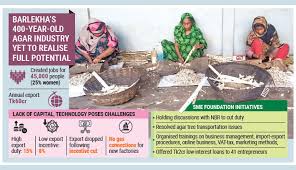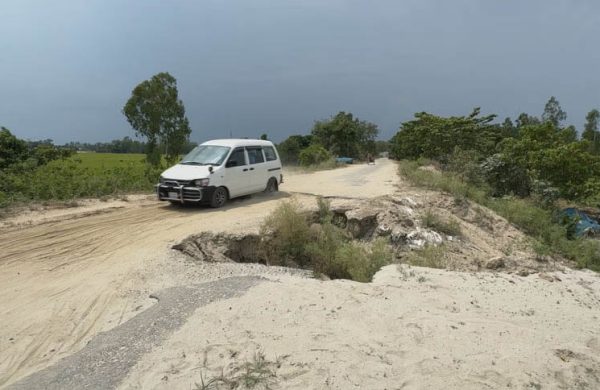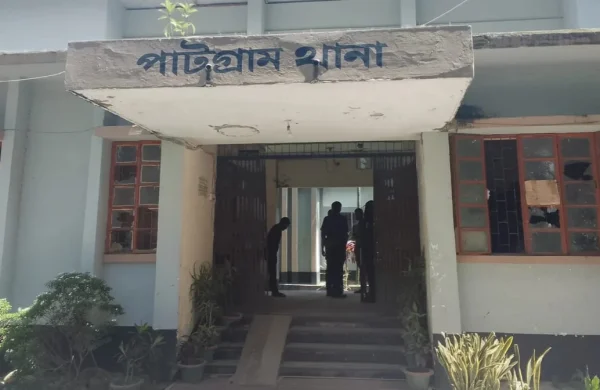Crises hamper agarwood perfume industry’s potentials
- Update Time : Thursday, January 9, 2025

TDS Desk:
Rows of agar trees line on both sides of the rural roads in Barlekha upazila of Moulvibazar. The fragrance of agar and attar fills the air as most houses in the area have attar factories. On one side of a courtyard, the agar trees are chopped, while on the other side women cut agar into smaller pieces.
In the factories, workers burn agar in cooking pots to extract distinctly fragrant attar oil, which is used in perfumes, incense, and essential oils that are famous in the global market.
The 100% export oriented industry has been thriving for hundreds of years, but its full potential is not realised yet due to different challenges, including high export duty and low incentives.
Around 100 attar oil manufacturing factories have developed centering Barlekha’s high-quality agarwood, locally known as “oud”, and attar, a traditional natural perfume.
Generations of entrepreneurs in this region have been involved in agar-attar business for almost 400 years. The agar oil production and agar plantation industries have created job opportunities for around 40,000 to 45,000 people, with about 25% of the workers being women. The annual export market for agar oil and attar is about Tk60 crore.
This industry utilizes every part of the raw material in the production. Entrepreneurs independently export perfumes (attar) and agarwood to various countries in the Middle East.
With the SME Foundation’s support, this sector is poised for further growth, benefiting both the local and national economy, said officials concerned.
LACK OF CAPITAL, TECHNOLOGY POSES CHALLENGES
The crisis in the agarwood industry is increasing as the 15% duty has become too high for them, especially since export incentives have also been reduced from 20% to 8%, said people involved in this business.
President of the Bangladesh Agar and Attar Manufacturers and Exporters Association and owner of Sadia Enterprise, Mohammad Ansarul Haque, said that their export dropped significantly when the government reduced the incentive to 8% last year.
If at least a 10% incentive was provided for the agricultural products, the industry would become profitable enough to sustain and expand its operations.
Absence of utility connections poses another problem for the industry. Many new factories cannot start productions as the authorities have stopped providing gas connections.
Lack of sufficient capital is also augmenting the industry’s crisis. It bars the perfume makers from implementing new technologies in attar production to keep up with the trends of globalisation.
Business owners said that the raw attar produced here is popular among consumers in various Middle Eastern countries. Currently, agar-attar is exported to Dubai, Saudi Arabia, Qatar, Kuwait, Bahrain, Malaysia, Oman, Yemen, and a number of European countries.
Bangladeshis in Kuwait, Saudi Arabia, Thailand, Malaysia, and United Arab Emirates, own several agar-attar factories. However, they cannot supply enough of their high-quality products to meet the demands.
They also point out that in Bangladesh, attar is not directly used to make perfume. However, developed countries use imported raw materials from here to create various types of perfumes, which dominate the global market.
SME FOUNDATION EXTENDS SUPPORT
The SME Foundation, through policy advocacy, prioritised agar as an industry in 2016. Agar, attar, oud, and agar powder are the main products of this cluster.
Anwar Hossain Chowdhury, managing director of the SME Foundation, “There have been multiple discussions with the National Board of Revenue regarding reducing the duty, and the discussions are ongoing. This is because these small SMEs need to be supported for the country’s interest.”
“Additionally, through the initiative of the foundation and with the involvement of the Ministry of Forests and Environment, the issues regarding the transportation of agar trees for the cluster’s entrepreneurs have been resolved. Efforts are also ongoing to address the gas connection issue,” he added.
Since 2013, the SME Foundation has been working on demand assessment and skill development through various programmes. Along with policy advocacy to solve entrepreneurs’ problems, it has also provided low-interest loans.
The foundation has organised training sessions on business management, import-export procedures, online business, VAT-tax, and marketing methods, and has offered low-interest loans of around Tk2 crore to 41 entrepreneurs.

















